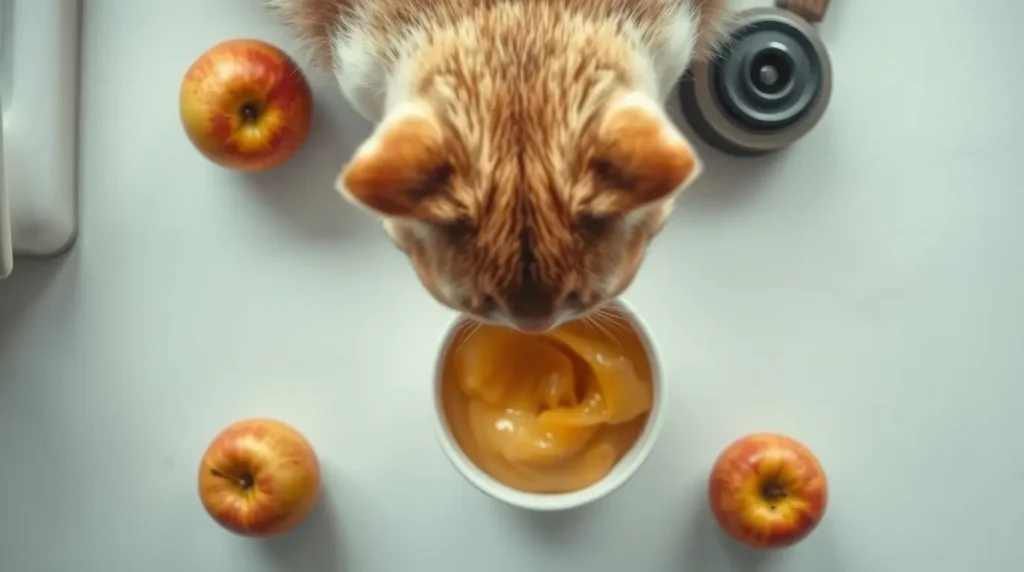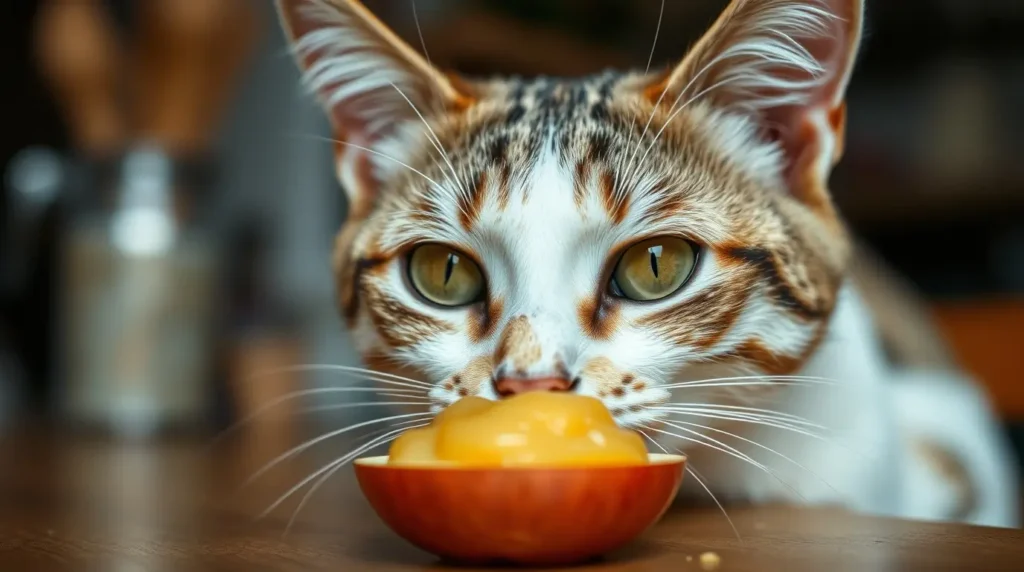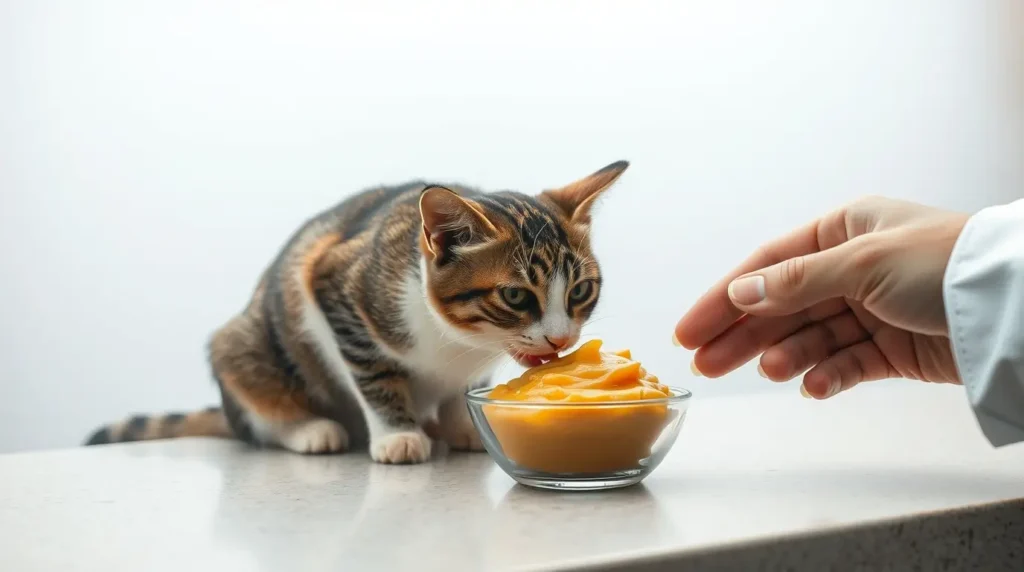Introduction
At Whizpet, we understand that pet owners want the best for their feline friends, which is why we conducted thorough research to answer the question: “Can I feed my cat applesauce?” Our team analyzed expert opinions, veterinary recommendations, and real pet owner experiences to provide a well-researched answer tailored to your cat’s health and safety.
Applesauce may seem like a harmless treat, but not all human foods are safe for cats. Can I feed my cat applesauce without worrying about health risks? While apples are non-toxic to cats, applesauce often contains added sugars, preservatives, and spices that may be harmful. Can I feed my cat applesauce if it’s unsweetened? Even then, moderation is key to avoiding digestive issues or long-term health problems.
Whizpet’s research explored veterinary studies and expert insights to uncover the impact of applesauce on feline health. We examined different types of applesauce, the effects of sugar and artificial additives, and the dangers of cinnamon and apple seeds.
In this blog, we’ll break down the key risks, safe alternatives, and expert-backed insights to help you make the best choice for your furry friend.

Can I Feed My Cat Applesauce? Understanding the Basics
Applesauce is essentially pureed apples, sometimes with added ingredients like sugar, preservatives, and spices. While apples themselves are non-toxic to cats, the additional ingredients in applesauce can pose health risks.
To determine whether feeding your cat applesauce is a good idea, let’s break it down into the key concerns every pet owner should know.
Cats have unique dietary needs, and their digestive systems are designed primarily for meat consumption. While small amounts of fruit may not be harmful, too much can lead to digestive distress. Can I feed my cat applesauce daily? The answer is no. Applesauce should only be an occasional treat, as excessive consumption may cause an upset stomach, diarrhea, or long-term metabolic issues due to the sugar content.
Moreover, many commercial applesauce brands contain artificial flavors and preservatives, which can be harmful to pets. Some even include xylitol, a toxic sugar substitute that can lead to severe health issues in cats. Can I feed my cat applesauce made at home? If you prepare unsweetened, pure applesauce without additives, it may be safer—but it’s still best to offer only tiny portions.
The best way to introduce any new food is with small test portions and close monitoring. If your cat shows any signs of digestive upset, such as vomiting or diarrhea, discontinue feeding immediately and consult your veterinarian.
3 Risks Every Cat Owner Must Know
1. Can I Feed My Cat Applesauce with High Sugar Content & Artificial Additives?
Most store-bought applesauce contains added sugars, artificial sweeteners, and preservatives that can be harmful to cats. Cats are obligate carnivores, meaning their digestive system is not designed to process high amounts of sugar.
Risks of High Sugar Content in Cats:
- Obesity: Excess sugar can contribute to unhealthy weight gain, leading to mobility issues and joint problems.
- Diabetes: Frequent sugar intake may increase the risk of feline diabetes, which can cause severe health complications.
- Digestive Issues: Too much sugar can lead to diarrhea, stomach discomfort, or bloating, making your cat feel unwell.
- Dental Problems: Sugary foods contribute to tooth decay and gum disease, which can lead to painful dental issues.
Another concern is artificial sweeteners, such as xylitol, which can be extremely toxic to cats. While xylitol is more commonly found in gum and candy, some flavored applesauce products might contain it. Even natural fruit sugars in applesauce can cause mild stomach upset in some cats.
Can I Feed My Cat Applesauce with Artificial Preservatives?
Many store-bought applesauce brands contain preservatives and artificial flavors to extend shelf life. These chemicals can irritate your cat’s digestive system and potentially lead to allergic reactions. Symptoms may include vomiting, lethargy, or an upset stomach.
Safer Alternative:
If you want to offer applesauce, opt for unsweetened applesauce with no artificial additives. Even then, serve only a teaspoon-sized portion occasionally and monitor your cat for any adverse reactions. When in doubt, consult a veterinarian before introducing new foods to your pet.
2. Can I Feed My Cat Applesauce with Cinnamon and Other Harmful Spices?
A common question pet owners ask is: “Can cats have applesauce with cinnamon?” While cinnamon is not toxic in small amounts, excessive consumption can lead to toxicity, causing liver damage and low blood sugar levels.
Signs of Cinnamon Toxicity in Cats:
- Vomiting or diarrhea
- Low blood sugar (hypoglycemia)
- Liver damage in severe cases
- Increased heart rate and respiratory issues
Cinnamon contains a compound called coumarin, which, in large quantities, can be harmful to a cat’s liver. Additionally, nutmeg—sometimes included in flavored applesauce—contains myristicin, a toxin that can cause severe neurological issues in cats, including hallucinations and seizures.
Can I feed my cat applesauce that contains cinnamon? Even if it’s a small amount, it’s best to avoid applesauce with added spices to prevent any potential risks to your pet’s health.
Safer Alternative:
If you want to share applesauce with your cat, ensure it’s plain and contains no spices like cinnamon or nutmeg. Stick to a tiny amount of unsweetened applesauce with no additives to minimize any health risks.
3. Can I Feed My Cat Applesauce with Apple Skin and Seeds?
Many pet owners wonder: “Can cats eat apple skin?” While apple flesh is safe in moderation, apple skin might contain pesticide residues, which can be harmful. Additionally, apple seeds contain cyanide, which is toxic to cats and should always be avoided.
Potential Risks:
- Cyanide Poisoning: Apple seeds contain amygdalin, which can release cyanide when ingested, potentially leading to poisoning.
- Pesticide Exposure: Unwashed apple skins may have pesticide residues that are harmful to cats and can lead to vomiting, lethargy, or other health complications.
- Digestive Issues: Some cats have trouble digesting apple skin, leading to mild stomach upset or discomfort.
If you’re wondering, “Can I feed my cat applesauce made from whole apples, including skin and seeds?” The answer is no. Even small amounts of apple seeds could accumulate toxins in a cat’s body over time.
Safer Alternative:
If offering fresh apple, make sure it’s peeled, seedless, and cut into small bite-sized pieces. Only provide a tiny portion as an occasional treat, and always monitor your cat’s reaction.

Safe Alternatives to Applesauce for Cats
If you’re looking for healthy treat options for your cat, consider these alternatives:
- Fresh Apples (peeled, seedless, and in moderation)
- Plain, Cooked Pumpkin (great for digestion)
- Unsweetened Applesauce (in very small amounts)
- Vet-approved cat treats with natural ingredients
While can I feed my cat applesauce is a common concern, the reality is that cats require a diet high in protein rather than fruits or vegetables. Too much applesauce—even unsweetened—can disrupt their dietary balance. Even natural sugars from fruit can lead to digestive discomfort and potential long-term health issues.
If you are looking for a safe way to satisfy your cat’s curiosity about fruit, consider offering small, fresh apple slices rather than applesauce. Always remove the peel and seeds to eliminate any potential toxins.
Additionally, cat-friendly treats formulated with feline health in mind are always the safest option. Instead of asking, “Can I feed my cat applesauce?”,It’s best to choose high-quality, protein-rich treats recommended by veterinarians.
Most Demanding FAQs About Can I Feed My Cat Applesauce?
1. Can cats eat unsweetened applesauce?
Yes, in very small amounts. Unsweetened applesauce without additives is a safer option but should still be given sparingly as an occasional treat.
2. Can I feed my cat applesauce if they are a kitten?
It’s best to avoid giving applesauce to kittens. Their digestive systems are more sensitive, and their primary diet should consist of high-quality kitten food.
3. Can cats eat apples?
Yes, cats can eat small amounts of apple flesh, but always remove the seeds and peel the skin to prevent exposure to harmful substances.
4. Can cats have cinnamon?
No, it’s not recommended. While a small amount might not cause immediate harm, larger amounts can lead to toxicity and health issues.
5. What human foods are safe for cats?
Some safe options include cooked lean meats, plain pumpkin, and small amounts of certain fruits like peeled apples or blueberries. Always introduce new foods gradually and consult your vet.
Conclusion: Can I Feed My Cat Applesauce?
So, can I feed my cat applesauce? Yes, but proceed with caution. While plain, unsweetened applesauce is not toxic to cats, it’s not an essential part of their diet and should only be given as an occasional treat. Always check for added sugars, spices, or preservatives that could harm your furry friend.
Instead of applesauce, opt for healthier alternatives like fresh apple slices (without skin or seeds) or vet-approved cat treats. Your cat’s well-being and joy should always come first!
Want to Keep Your Cat Healthy?
If you’re unsure about introducing new foods to your cat, always consult a veterinarian. For more expert pet care tips, subscribe to our newsletter today!
Related blog: For more detailed information about pet care

